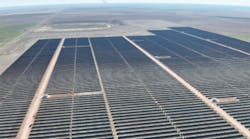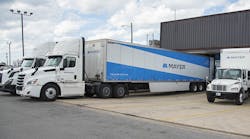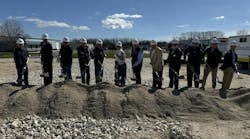As the Obama administration gets settled in at The White House, a few blocks away at the annual conference of the National Association of Wholesaler-Distributors (NAW), held Jan. 27-29 in Washington, D.C., several veterans of the legislative wars on Capitol Hill said it was a little too early to tell how well the new administration will work with NAW and other pro-business trade groups.
Between them, Dirk Van Dongen, NAW president, Jade West, senior vice-president government relations, and Jim Anderson, vice-president government relations, have close to 100 years of experience as lobbyists, and they have seen many U.S. presidents come and go. While they agreed President Obama has made some early overtures toward business supporters in both political parties, Van Dongen, West and Anderson said the real work has yet to begin in the crafting and passage of legislation. During a press briefing at the NAW conference, they said they have seen some similarities between the early days of the Obama administration and the same time period during other administrations.
Van Dongen says Obama is still in the honeymoon stage of his relationship with the American public and that it may last until people start getting frustrated that economic conditions aren't improving as fast as they would like. At that point, he said, Obama may “inherit” the economic problems, much like President Reagan inherited the economic problems that took root in the Carter administration. “The last time a president came into office this popular was Reagan,” he said. “But watch Obama and see how long it takes before he owns the (economic) problems.”
He also said that while many of the senior-level appointees in the new administration had experience in the Clinton administration, many of the other 2,000-plus political appointees that typically come in with a new administration “are still getting their sea legs.” “They have to populate all of those positions,” he said. “There is a lot of (singing) ‘Kumbaya’ right now and (people) asking, ‘Why can't we play nice?’”
Van Dongen said Obama is probably already learning that he has to tone down some of his campaign rhetoric to get his programs passed into law.
West, Anderson and Van Dongen were not happy with the stimulus package passed by the House of Representatives on Jan. 28, and said it was a “very flawed piece of legislation.” They were also concerned that Obama will eventually push for passage of the Employee Free Choice Act (EFCA), more commonly called the “card check law,” which is generally considered to be pro-labor legislation that would simplify union-organizing activities. According to a briefing at www.naw.org, under a card check system, a union conducting an organizing drive would be immediately and automatically recognized as the certified collective bargaining agent if it's able to persuade 50 percent plus one of the employees in a workplace to sign authorization cards. However, West said because Obama quietly appointed his new Secretary of Labor (Hilda Solis, a U.S. Congresswoman from California) well after other cabinet appointees, it may have been a sign that he is not going to aggressively pursue the pro-labor agenda favored by union donors to his campaign.
Van Dongen, West and Anderson are bracing themselves for a flurry of legislative proposals over the next four years that will not be popular with pro-business groups. Van Dongen likened the likely legislation to “cuts by a thousand rusty razors.” “This stuff is going to come at us like shotgun pellets,” he said.
He urged all distributors to contact their local U.S. Representatives and Senators whenever they have concerns about legislation under consideration in Washington. “We cannot stop these things on our own.”
A not totally unexpected recession. The results of the Presidential election didn't come as a surprise to the NAW execs and other Washington insiders, and it wasn't a surprise for NAW members who attended last year's conference that the economy is now wallowing in a recession. That's because Alan Beaulieu, principal, Institute for Trend Research, Concord, N.H., a speaker at the 2008 NAW Conference told members that in 2009 the United States would be in recession. He was months ahead of other economists in uttering the dreaded “R” word. But at the 2008 meeting and again at NAW's 2009 Conference, Beaulieu urged distributors to take charge of their own destinies. “Don't let politicians or the media affect your future,” he said. “As business leaders, you can make the future.”
His forecast for the U.S. economy in 2009 is more optimistic than that of many other economists. He thinks most economic indicators will start turning positive in the third quarter and that the economy will begin a slow recovery after that. However, he said the next six months would be very rough. Beaulieu also said home prices haven't bottomed out yet, and he doesn't expect banks to start lending money until 2010, when they believe economic conditions will start to improve.
“Most indicators will turn positive before the stimulus package begins having an impact in 2010,” he said. “Obama will win in a landslide in 2012 because he will get credit for the recovery.”
Beaulieu said one indicator that distributors should watch closely is the Purchasing Managers Index (PMI), a survey of U.S.-based purchasing managers, because it has proven to be a reliable indicator that leads the overall economy by nine to 12 months. Until the PMI turns around, he said there won't be a recovery.
In other news at the 2009 NAW Annual Conference, Chip Hornsby, CEO of Wolseley plc, was elected to serve a second consecutive term as NAW chairman, and the association announced a new alliance with Texas A&M University. The Council for Research on Distributor Competitiveness (CRDC) is a research consortium focused on sales and marketing optimization. Distributor and manufacturer members will work together with faculty at Texas A&M's Industrial Distribution program to jointly develop solutions to improve profitability.
For the $25,000 membership fee, consortium members will get company-specific workshops and 20 seats at all related educational programs. The consortium's research efforts will begin in April with a kick-off meeting and conclude in March 2010 with a final presentation of research findings.
The 2010 NAW Annual Conference will be held Jan. 26-28 in Washington, D.C.








